|
Not only has Kenya been recognized as the "cradle of humanity" but it has one of the most diverse and colorful collection
of tribal people on the continent. The country is multi-ethnic and administrative arrangements closely parallel ethnic
boundaries. The largest ethnic groups are the Kikuyu, Luhya, Luo, Kamba and Kalenjin. Kenya has some of the largest,
best-stocked and most accessible game parks in Africa, coral reefs and palm-fringed white-sand beaches along the Indian
Ocean. Wild life protection (instead of poaching) helps local tribes and country inhabitants to income and employment
from the tourist industry. In Jackson at Rekero in the Masai Mara conservation area, local Masai became shareholder in
a safari camp to the benefit of his whole village. A rich farming area is found near Nakuru. Mombassa has chronic water
problems.
|
|

Rift Valley Outlook
©2001: Kenyalogy
Javier Gómez-García
|
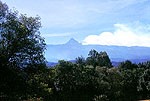
Mount Kenya
©2001: Kenyalogy
Javier Gómez-García
|
|
Thanks to the temperate climate of its plateau, Kenya has attracted large numbers of European colonists who tried to slow
down the evolution of the country towards independence. European settlement met with a lot of African armed resistance and
by the early 1920s African political organisations had begun to develop. By the 1940s European settlers had become very
wealthy while the growth in the African population resulted in increasing pressure for land.

©2001: Kenyalogy
Javier Gómez-García
|

Northern Frontier
©2001: Kenyalogy
Javier Gómez-García
|
|
|
The name Kenya that now brings to mind Safaris in pristine reserves, meant not so long ago Mau Mau atrocities against
white settlers and earlier still, new beginnings for impoverished ends of british families with enough political influence
to get valuable land grants in that colony. Kenya has been a crossroad for centuries as various tribes moved into the
fertile temperate plateau from the north and the west and Arabs occupied the coast. The British rushed in during the
great colonial land grab of the 19th century and took the best lands to install the white plantation settlers that the
Mau Mau would try to eliminate in the 20th. The Mau Mau hero, "Burning Spear" Jomo Kenyatta led his country quite
successfully from independence in 1964 to his death in 1978. Power then passed into the hands of the dictator Daniel
Arap Moi who still controls the country in the best interests of his friends and of his tribe the Tugen.
|
Culture:
At Bomas of Kenya in Nairobi you can see traditional dances and hear songs from the country’s 16 ethnic groups at this
cultural center in Langata. Daily performances at 2.30 p.m.
Thonga is a Kenyan piece of cloth which can be used as skirt during the day, tablecloth at dinner time, bed sheet at night
time, towel in the morning. Every Maasai wears a red mantle, for protection and for tribal identification.
|
In public schools, girls must shave their head to avoid attracting and exciting the boys. A Masaai boy becomes a man
at 15-18 when he is circumcised. He moves to a “warrior village”, outside the main village, where as a junior warrior,
he is trained at the sciences and arts of war for a few years. Upon graduation, he becomes, a senior warrior. Then, only
then, he can get married. He can't date or marry within his village. Consanguinity is a constant worry. When a village
becomes too populous (more than 75), it splits into two. In Maasai society, boys and girls date, and of course, kiss
and have sex. Adults overlook the dating, along the line of a "don't ask, don't tell" policy. Therefore, girls don't
have to be virgins on their wedding day. They are married very early to prevent unwanted pregnancy. When the girl is
pretty and talented, the dowry is usually around twenty cows to be delivered to the father of the bride. A not so hot
girl can be had for about five cows. When a man has no cows at all (poor guy), the families can get together and loan
him a few. Otherwise, a girl can be given to him for free. In this case, the girl comes with no warranty and is usually
a used one (not meaning pre-owned). So it goes in Kenya with the Maasai tribe. They founded Nairobi and they are the
only one of the 47 tribes which has kept up with these traditional values and customs. Once the cow deal is done, the
bride-to-be, usually very young, 14 to 16 year old, is readied for the wedding. First she is circumcised. An experienced
matron with a sharp knife amputates her clitoris. She will later cut her hair because long hair attracts every man,
short hair attracts only her husband. Bride and groom will see each other for the first time on wedding day. Too bad
for the man if he does not like the bride at all. Cows are already exchanged, the deal is sealed. The groom comes to
the bride's village and take her to his own village where she would live for the rest of her life, making many children.
Before she leaves, her father will bless her with … cow milk.
|
|
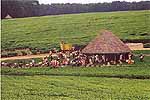
Sotik thea plant
©2002: Boudewijn
Hoogeweegen
|
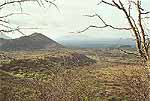
Tsavo hills
©2002: Boudewijn
Hoogeweegen
|
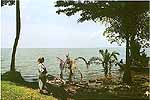
Lake Victoria
©2002: Boudewijn
Hoogeweegen
|
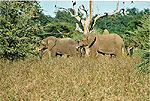
2Boys
©2002: Boudewijn
Hoogeweegen
|
|
THE MAASAI PEOPLE:
To the early explorers the Maasai people were greatly feared. They were seen as a fierce people who barred progress.
Today there is a paradigm in this culture — a shifting from traditional values towards the commercialization of this
tribal group. The Maasai occupy a large area in East Africa. Traditionally they are a nomadic people that frequently
move to follow grazing and water. In the past their aggression confined many tribes, such as the Kikuyu, to the high
ground. Today these two tribal groups can be seen together in churches.
The Masai believe that all cattle in the world belong to them, even though some may have temporarily found themselves
in the possession of others. Thus, the Masai are always justified in raiding their non-Masai neighbors in order to
"return" the cattle to the rightful owners. For centuries the Masai have hunted the lions on the Mara, both as a test
of manhood and to protect their cattle. The lions have learned to recognize the red robes (and spears, no doubt) and
instinctively keep their distance. While we were on the Mara, we noticed several lions suddenly become agitated and
hunker down in the grass when they saw a Masai far off in the distance. The lions didn't care one iota about all the
vehicles full of people that were much closer. They do not associate the vehicles -- or the people in them -- with danger.
But one red-robed Masai far in the distance was enough to seize their attention.
The Masai (and the Samburu) have very elaborate "coming of age" traditions. Boys are circumcised in their early teens
in a ceremony attended by the entire village. The boy who flinches during this procedure brands himself as a coward
and disgraces his family. Once circumcised, the young man becomes a member of the warrior class -- a moran -- and must
live apart from the village with the other warriors. Eventually, at some point in his late teens or early twenties, a
moran is chosen to become a junior elder, earns the right to marry and returns to live in the village.
Matatu :
A matatu is a mini-bus connecting different areas of Nairobi to the the city's outskirts or suburbs or to a distant
Kenyan city. Matatus are also found in Mombasa. Riding a matatu is a thrill which is best experienced on the sidewalk!
Made for a maximum of 14 passengers, a matatu can squeeze in up to twenty bodies paying from 20 KHS (30 cents) to
500 KHS (8 dollars) a piece, depending on the passenger's destination. A matatu is like a juke box. Passengers request
their favorite tunes and the driver will play them as loud as possible. The matatu phenomenon, so entrenched in the
Nairobi sub-culture, is difficult for a foreigner to understand. Just imagine, a passenger may actually become fan of
one matatu. So much of a fan, that he will ride none but this specific matatu.
|

